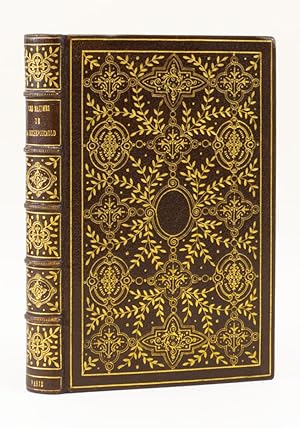About this Item
188 x 104 pp. (6 3/4 x 4 1/4"). XL, 290 pp., [1] leaf.Preface and notes by J.-F. Thénard. With the autobiographical essay "Self-Portrait by Himself" from the 1665 first edition, the introductions to the 1665 and the 1678 (fifth) editions, maxims removed from earlier editions, and the posthumously published essays "Reflections." EXQUISITE DARK BROWN MOROCCO, EXUBERANTLY GILT IN THE FANFARE STYLE, BY ZAEHNSDORF (stamp-signed in gilt on front turn-in, blind Exhibition stamp on rear doublure), covers with fillet border enclosing a panel with central oval strapwork medallion surrounded by rows of geometric ornaments, with sprays of leafy fronds connecting them and filling the space between, raised bands, spine compartments with central geometric ornament with leafy cornerpieces, gilt lettering, turn-ins with gilt fillets accented with leaf sprigs, crimson silk doublures and free endleaves, all edges gilt. Printer's device on title page. Front flyleaf with quote (in French) from the text ["It is more necessary to study men than to study books"] and "Christmas 1895" written in ink; recto of rear free endleaf with Taplow Court library label of William Grenfell, Baron Desborough. â Minor soiling to flyleaves, very faint browning to edges of leaves, otherwise very fine, the text clean and fresh, and in a virtually unworn binding bright with gilt. This comprehensive edition of the French moralist's famed collection of epigrams is offered here in a binding done in the fanfare style popular when this work was first printed. After a turbulent youth of court intrigue and aristocratic rebellions against King Louis XIII, François, Duc de La Rochefoucauld (1613-80) settled into a quiet life in the Parisian salons of Madame de Sablé, Madame de Sévigné, and Madame de La Fayette. It was among this intellectual, witty society that he honed the pithy epigrams that would have such an influence on French literature and culture. As the Oxford Companion notes, "The high degree of polish in the phrasing of the 'Maximes,' which excel in conciseness, precision, and appropriateness of expression, is to some extent due to discussions among his friends . . . . The work is a collection of some 500 gnomic sentences in which the author analyses the motives of human conduct with merciless penetration. While he recognizes in rare cases the existence of pure virtue and disinterested sentiments, he finds them tainted, almost universally, with some element of self-love or interested motive." Voltaire drew on La Rochefoucauld's views when writing "Candide," and the "Maximes" impacted the works of French writers from Stendhal to André Gide, as well as philosopher Friedrich Nietzsche and English novelist Thomas Hardy. The duke's worldview would have resonated with former owner William Grenfell, Baron Desborough (1855-1945), a sportsman and indefatigable public servant who was one of the founding members of The Souls (fl. 1886-1900), an elite group of friends whose social gatherings for intellectual discussions were perhaps Victorian London's closest approximation of a Parisian salon. Although other members included prominent and accomplished men and women, it was the parties given by Grenfell's wife and fellow Soul Ettie that attracted guests like Vita Sackville-West, H. G. Wells, Edith Wharton, Oscar Wilde, Edward VII (when Prince of Wales), and Winston Churchill. One can easily imagine one of the Souls presenting this volume to the Grenfells for Christmas in 1895. By one of the great London workshops, the binding here is a modified example of the fanfare style of decoration popular in France from the late 16th to mid-17th century. The main features of this style, in Glaister's words, "are interlacing ribbons" that form "compartments of various shapes, with emphasis given to a central compartment." Ornaments made with small hand tools "fill all the compartments except the central one and almost completely cover the sides." The fanfare style is perhaps most frequently. Seller Inventory # ST17001
Contact seller
Report this item
![]()



